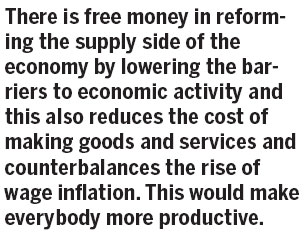Lionomics, the new economic vision
Updated: 2013-05-04 05:54
By Richard Harris(HK Edition)
|
|||||||
The global economy is unwell. The United States is holding its own buoyed by a sugar rush of printed money from the Federal Reserve. Europe is mired in recession - in some places a depression, with massive unemployment and a huge debt burden. Emerging markets are struggling as they depend upon these stuttering engines of world growth.
The economic growth of the Chinese mainland has been historically exceptional. As the second-largest economy in the world, the mainland can no longer be described as emerging. It may be young, it may be growing fast, it may have an export-led economy, but it is not emerging.

China's leaders know that we are entering a new phase of challenges that must be addressed in a way that suits the nation's unique environment. Premier Li Keqiang said recently that "overall, the Chinese economy had a smooth start in 2013. But many uncertainties, both at home and abroad, still persist and make the overall situation quite complicated". President Xi Jinping said China's economy would continue to grow rapidly for years to come, but that the days of "ultra-high speed growth" seen in the past three decades were over and no longer desirable.
The latest annual economic growth figure of 7.7 percent confirms the slowing, yet this is still impressive growth in both an absolute and a relative sense as growth everywhere is much less than before. The mainland's slowdown is inevitable as high growth rates are mathematically unsustainable in a country of 1.3 billion people. The challenge is now to manage steady growth as the economy begins to broaden.
Premier Li has said that the mainland needs a "sound footing" to create an "upgraded version" of the economy and that the nation must "solidly advance reform". This PhD in economics has promoted the mainland's leading global investor, Lou Jiwei, from running the sovereign wealth fund to finance minister. The scene is set for as bold a reform in the economic agenda as ever in China's history.
A new set of economic policy options to suit the mainland's unique economic environment might be termed Lionomics after the prime minister, for it is he who is responsible for the economy. Reform must not follow the West's destructive route of printing money. That is the route of a mature post-growth, debt-burdened economy; not a growth market. It may be tempting to jump into the same leaky lifeboat but economic sustainability requires manageable debt, low inflation, steady growth and a strong currency.
Reform must also avoid the West's practice of supporting declining industries, especially as the mainland's export sector matures. It is very painful to see hitherto successful industries suffer but sustainability demands change. The mainland's advantage at present is that it still has a flexible, hardworking population, suited to persisting against adversity.
Top of the list is a rebalancing of the economy from public investment-led growth to private consumption. Further use of the minimum wage to push the wealth down to the poorest worker means that there is more money in the consumers' pockets to accelerate the move to a domestic-led economy. Chinese products will move up the quality and value-added scale and enforceable warranties might be applied to all goods to ensure that once they are sold, they work.

There is free money in reforming the supply side of the economy by lowering the barriers to economic activity and this also reduces the cost of making goods and services and counterbalances the rise of wage inflation. This would make everybody more productive.
Such barriers include hidden, wasted costs such as gridlock in Beijing, Shanghai and other major cities, which could be eased with creative spending on more urban and suburban public transport hubs. Building low-cost housing for those millions who cannot afford private apartments would give more to the consumer and store up wealth for the future. Deregulation and simplification of the tax code are also likely to assist the economy to be more productive.
A great deal of economic energy could be released through privatization of State-owned industries. For in today's marketplace, it is regulation that controls the economy - not ownership of shares. The responsibility for growth will move to managers and investors rather than the government, which can then focus on making the economic playing field the best there is. Being privately owned will make it easier for mainland companies to expand overseas.
The new set of reforms is yet to be announced but the indications are that they may be far-reaching. If so, we will see a novel package of economic theory for the successful development of a growth economy. Could Premier Li then become the Lion of Chinese economics?
The author is chief executive of Port Shelter Investment Management.
(HK Edition 05/04/2013 page4)